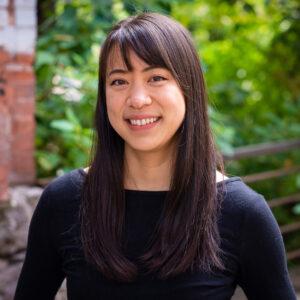
Communications Coordinator
A portrait of Carson Viles. Photo credit: Miakah Nix
Carson Viles (Confederated Tribes of Siletz Indians, Che’-me’-dv-ne, Chinook) began his work with Ecotrust as an Indigenous Fellow in the summer of 2020. Now as Ecotrust’s Tribal Network Strategist, Carson discusses his role in a growing body of work at Ecotrust around Indigenous stewardship and co-management and how relocating to Alaska from Oregon has impacted his own personal growth. Here are excerpts from a conversation Carson had with our Communications Coordinator Emilie Chen.
Can you talk a little bit about the work you were doing before your Fellowship with Ecotrust and how you were first introduced to the organization?
I was an environmental studies major at the University of Oregon, and I was doing a lot of language revitalization work. My own family’s heritage dialect is underrepresented in teaching materials, because, well, of a lot of factors—but there’s a lot of archival documentation of the dialect. Myself and a couple other people from that dialect speech community got together and put in a National Science Foundation grant to make our language materials that are housed at university archives more available to tribal language programs to help the community with revitalization.
My first major contact with Ecotrust was actually through my partner, Miakah [Nix] applying for the Indigenous Fellowship in 2018. I met Jon Bonkoski [Knowledge Systems Director] through her. He was working with Tolowa Dee-ni’ Nation to develop the first iteration of an Indigenous and Traditional Knowledge (ITK) database with a lot of the same people that I was in contact with in my work with the university archives. So when the [2020] Fellowship became open, Jon encouraged me to apply.
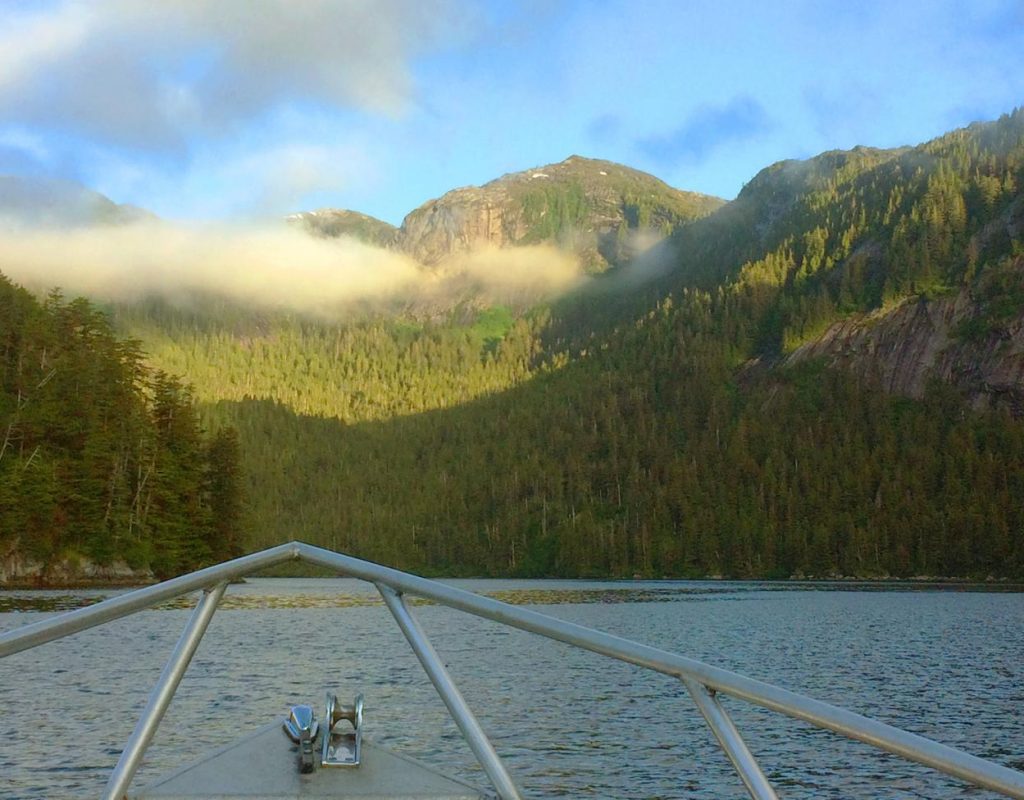
Photo credit: Miakah Nix
Your Fellowship has transitioned into a full-time role with Ecotrust this year: Tribal Network Strategist. Could you talk about the projects you’ve been working on?
I was hired to participate in the Tribal Marine Stewards Network in California. This network brings together four tribal partners to increase tribal participation in the management of Marine Protected Areas (MPAs). It’s the culmination of many years of work for these partner tribes. They’re building new frameworks to support Indigenous-led management in California, and we’re playing a support role in that effort. A lot of my time has been spent helping with technical aspects of planning and network development.
One area I’m really excited about is the launch of the ITK database with the partner tribes.
People are pretty familiar with repatriating physical materials that were taken out of our communities: basketry, regalia, and other things. Well, this is kind of a parallel effort. There’s so much information in university archives, and a lot of it is misinterpreted by academics from outside the community. A lot of it is not really appropriate for the general public. A lot of it is appropriate to share, but not available to our community. Our first project as a member of the Network is to co-create a similar process of repatriating knowledge through this ITK database and developing the tribe’s capacity to safely house these materials and give back to the community, so that those teachings can be put back into conversation with the teachings being passed on orally in our communities today.
“
Taking those archival materials out of being frozen in time and back into the living—to me, that’s what all of this work is about. It’s about, okay, we can actually bring ourselves as a community forward and practice land management as we really are.
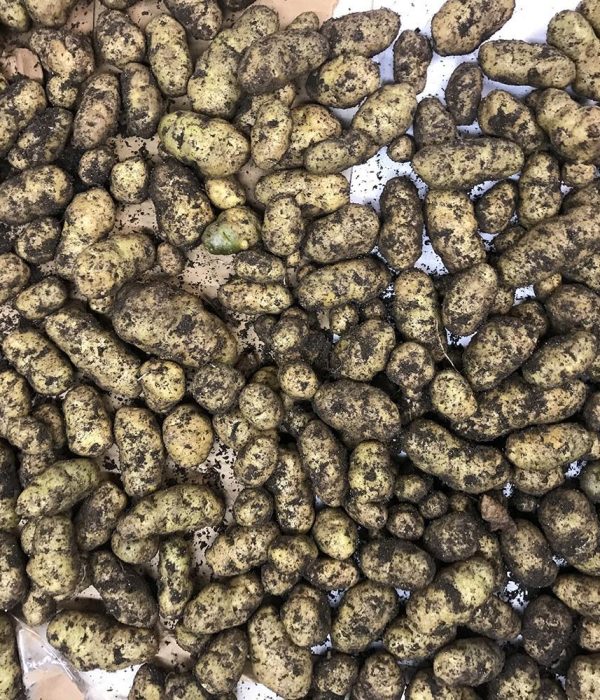
Dozens of Tlingit potatoes. Photo courtesy of Carson Viles and Miakah Nix
Miakah and I are also working on a project to promote growing k’ύnts’—Tlingit potatoes. They’re a variety of potato that was traded straight up from South America, so it has never been to Europe. In Tlingit and Haida communities, they’ve been grown for a long time. And a lot of people here remember the Tlingit potato beds from when they were growing up. But over the last 40 or 50 years, they have stopped being propagated as widely.
I’m also pretty involved with the Sustainable Southeast Partnership. I don’t have a really big voice in the SSP pretty intentionally—because I’m not from up here and I haven’t been living here long—but I have been really happy to participate. It’s really cool to see a partnership like that put Native voices forward in a more organic way.
My understanding is that a lot of your work with the Tribal Marine Stewards Network and the ITK database right now is focused on relationship-building. Can you elaborate on why that is so important at this stage?
A lot of the archival notes housed in those university databases were taken by this Bureau of Ethnography that the US government used to run. They sent people out to interview Native people for posterity’s sake, thinking, “Oh, Indians are going to go extinct, and we’re going to document all their knowledge.” At the same time they were doing that, people were getting kidnapped, forced into boarding schools. It’s not easy for the community to take their knowledge and put it into a shared space, because that hasn’t been safe to do for almost 200 years out here on the west coast.
“
To build that partnership takes changing perspectives of all parties and raising awareness that tribes aren’t just a monolith. It’s not just doing outreach to one community.
Relationship-building in partnerships that involve a tribal and a non-tribal partner is often posed as a dichotomy: a tribe partnering with the state, or the tribe partnering with a non-governmental organization.
What that fails to capture is that within the community, the tribe is the government. And when you’re talking about making a collective push together, you’re bringing together elected tribal officials; hereditary chiefs or traditional leadership and ceremonial leaders; people who have a recognized leadership role that may not be acknowledged by western law, like respected elders in the community. In Alaska, you have tribal corporations, tribes, or organized villages. You’re moving all these partners on the tribal side. And then on the non-tribal side, you have local, regional, state, and national governmental organizations; NGOs and all those different scales; neighbors; so many different moving pieces.
To build that partnership takes changing perspectives of all parties and raising awareness that tribes aren’t just a monolith. It’s not just doing outreach to one community, but instead realizing it’s really about pulling together a bunch of different organizations, a bunch of different decision makers, and building a coalition together. It’s so complicated.
For Ecotrust, the database has been a big way to support each community. We’re bringing together different tribal leaders to envision the next steps they want to take in creating a new management framework for each community’s knowledge system. As they decide how they want to move forward, tribes can have a secure space where they’re able to house archival materials, contemporary interviews, videos of elders sharing at Culture Camp. This can help tribes in beginning to feel like they are able to take back those things that were taken and steward them like they’re supposed to, so that when tribes are coming to those conversations with outside partners, it’s from a position of strength.
“
Change and adaptability, those are hallmarks of our culture. So when we’re not allowed to change, we’re not allowed to carry our culture forward.
Taking those archival materials out of being frozen in time and back into the living—to me, that’s what all of this work is about. It’s about, okay, we can actually bring ourselves as a community forward and practice land management as we really are. Practice education as we really are. It means carrying forward each community’s story, actually being able to put that forward, and being honest about that.
While the Tribal Marine Stewards Network project is primarily with California partners, you’re working out of Kake, Alaska. Had you been to Alaska before relocating there last year?
I had been to Hydaburg with Miakah before, where her dad grew up. And when Miakah was living in Hoonah for her fellowship, I went up to visit her for a couple weeks, and I liked it a lot.
And then Miakah got that job offer as KKCFP Coordinator in Kake, and that was right when my grant was wrapping up at the University of Oregon. So I actually moved to Kake sight unseen.
When Miakah got an opportunity to work up here, I could really see where she was coming from, what the benefit would be to her life. And I was also feeling some of that. It’s cool to see and hear connections to when my grandma was a kid on the reservation. There are still a lot of people fishing and gathering their own food at Siletz, but not to the extent that it was before. To see how it is in Southeast Alaska made me reflect differently on the stories that I heard growing up, and it was a really cool, really positive experience on a personal level.
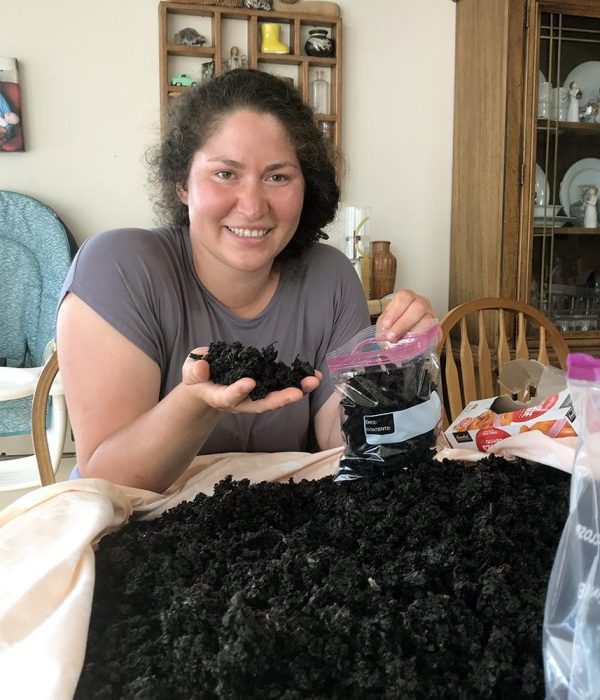
Miakah Nix holds dried seaweed, a traditional food important to the Kake community. Photo credit: Carson Viles
Adaptability and change—those are really integral values that I’ve heard in my own community and up here. People don’t think of Native people that way, because to the popular view, we’re frozen in time. You see it in all kinds of ways: you see it in blood quantum, you see it with “Well, sure, you guys can be allowed to fish, but only with spears and whatever.”
But it’s a little more insidious than that, because change and adaptability, those are hallmarks of our culture. So when we’re not allowed to change, we’re not allowed to carry our culture forward.
For these two projects that you’re working on, what are the ideal outcomes you’d like to see for each of them over the next few years?
For the Tribal Marine Stewards Network, it’s been difficult [during the COVID-19 pandemic] to build relationships with people that I didn’t already know. Because on Zoom calls, you just take care of work. Sitting down drinking coffee or eating lunch with people—it’s really hard to translate that digitally. But I think we’re doing as good of a job as we can. I’m just really looking forward to getting to meet people in person.
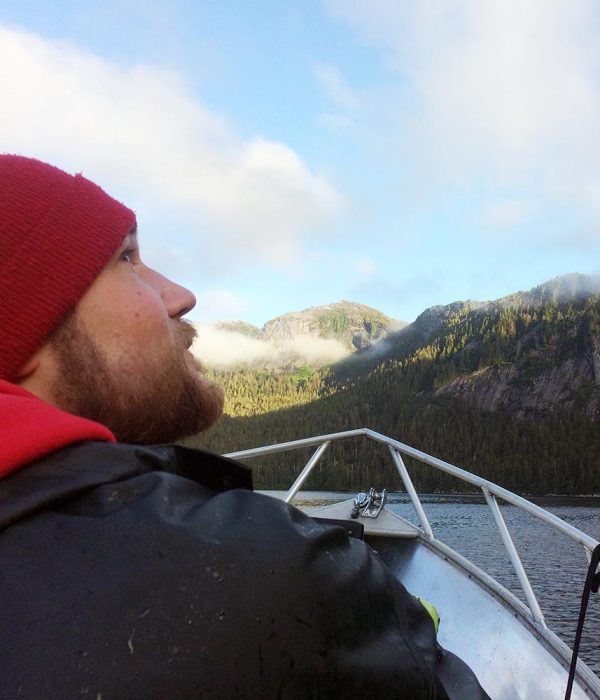
Carson during a fishing trip. Photo credit: Miakah Nix
We’re just starting the visioning and planning for the shape that the Network is going to take. In the next three to five years, what I would love to see is the fruits of that labor: the network staff, all of the partner tribes, initial projects going well, and to be able to act as a stepping stone towards hiring actual guardians in their own communities. Things have gotten off to a strong start. In two years from now, the partner tribes will have taken even more steps towards that model. It’s going to be a huge boost for those communities.
With the Tlingit potato project, the really big dream is to see people supported in going back to traditional garden and fishing places. There’s a really violent legacy of dispossession, of burning down fish camps, kicking people off the land that went well into the ’60s up here. I would just love to see continued change. Any part that I can play in that would be really rewarding.
Thank you, Carson.

Current Project

Website
A collective working to strengthen cultural, ecological, and economic resilience across Southeast Alaska.